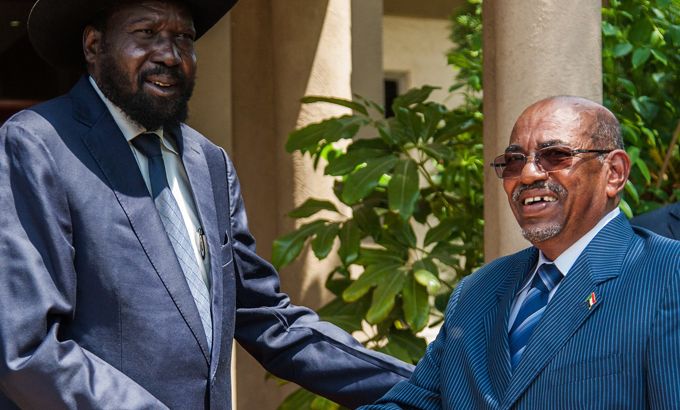Sudan and S Sudan agree to protect oilfields
Sudan and South Sudan agree to consider setting up a joint force to protect vital oilfields during the crisis.

Sudan and South Sudan have agreed to consider setting up a joint force to protect vital oilfields during the ongoing crisis in the South, Sudan’s foreign minister has said.
The discussion was broached on Monday during a visit to Juba by Sudanese President Omar al-Bashir, where South Sudan requested talks on deploying a joint force to secure at-risk oil fields.
“Sudan and South Sudan are in consultations about the deployment of a mixed force to protect the oilfields in the South,” Foreign Minister Ali Ahmed Karti said, adding that Juba had come up with the proposal.
Karti spoke at the airport in Khartoum after visiting Juba where Bashir met Salva Kiir, president of South Sudan, in a diplomatic effort to halt fighting in South Sudan.
Sudan fears the three-week-old conflict in its southern neighbour could disrupt oil flows and damage its own struggling economy.
Bashir’s visit came as negotiators in Ethiopia began a process of direct ceasefire talks to end weeks of fighting.
“There should be peace and security in South Sudan,” Bashir said.
“We come so that we can bring peace to South Sudan, to our brothers and sisters in South Sudan. Our relationship is very important,” he told reporters.
Earlier, the Foreign Ministry spokesman in Khartoum reaffirmed Sudan’s wish to see “a continuation of the political process aimed at finding a peaceful resolution to the conflict in South Sudan”.
He also underlined Sudan’s willingness “to offer everything in its power to ensure success of the initiative by IGAD”, the East African regional bloc brokering the talks.
The diplomatic effort is aimed at ending three weeks of fighting in South Sudan that has left thousands dead and about 200,000 people displaced.
Direct talks
Direct peace talks began on Monday after days of trying to get the rival delegations in to the same room, AFP news agency quoted Ethiopia’s government spokesman as saying.
Oil production in South Sudan has slumped by about 15 percent since the fighting erupted.
The conflict began on December 15, pitting army units loyal to Kiir against a loose alliance of ethnic armed groups and mutinous army commanders nominally headed by Riek Machar, a former vice president who was sacked last July.
Machar denies allegations that he started the conflict by attempting a coup, and in turn accuses the president of orchestrating a violent purge.
UN officials say they believe thousands of people have already been killed, and both sides are alleged to have committed atrocities.
UN peacekeeping bases have also been overwhelmed with civilians seeking shelter, many of them fleeing ethnic violence between Kiir’s Dinka community and Machar’s Nuer tribe.